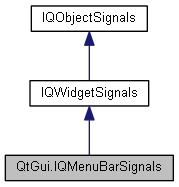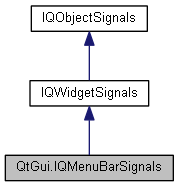|
Qyoto
4.0.5
Qyoto is a C# language binding for Qt
|
|
Qyoto
4.0.5
Qyoto is a C# language binding for Qt
|


Public Member Functions | |
| void | Triggered (QAction action) |
| | |
| void | Hovered (QAction action) |
| | |
| void | Activated (int itemId) |
| void | Highlighted (int itemId) |
 Public Member Functions inherited from QtGui.IQWidgetSignals Public Member Functions inherited from QtGui.IQWidgetSignals | |
| void | CustomContextMenuRequested (QPoint pos) |
| | |
 Public Member Functions inherited from QtCore.IQObjectSignals Public Member Functions inherited from QtCore.IQObjectSignals | |
| void | Destroyed (QObject arg1) |
| void | Destroyed () |
| | |
| void QtGui.IQMenuBarSignals.Activated | ( | int | itemId | ) |
| void QtGui.IQMenuBarSignals.Highlighted | ( | int | itemId | ) |
| void QtGui.IQMenuBarSignals.Hovered | ( | QAction | action | ) |
This signal is emitted when a menu action is highlighted; action is the action that caused the event to be sent.
Often this is used to update status information.
See also triggered() and QAction::hovered().
| void QtGui.IQMenuBarSignals.Triggered | ( | QAction | action | ) |
This signal is emitted when an action in a menu belonging to this menubar is triggered as a result of a mouse click; action is the action that caused the signal to be emitted.
Note: QMenuBar has to have ownership of the QMenu in order this signal to work.
Normally, you connect each menu action to a single slot using QAction::triggered(), but sometimes you will want to connect several items to a single slot (most often if the user selects from an array). This signal is useful in such cases.
See also hovered() and QAction::triggered().